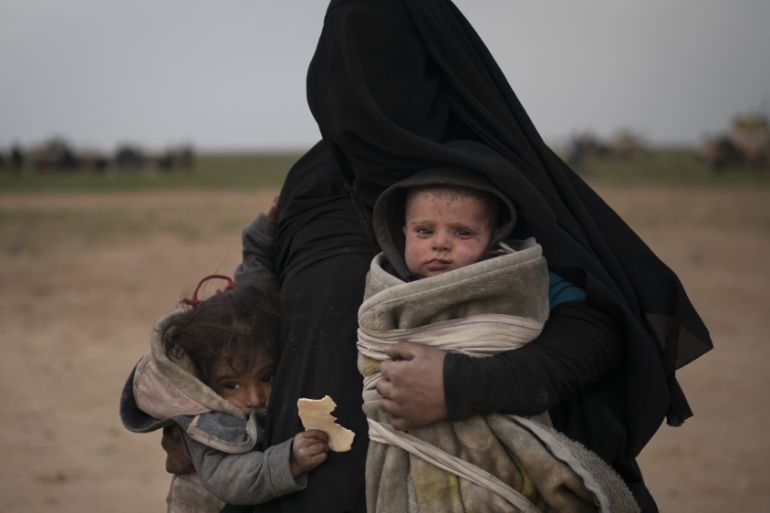Western Europe must repatriate its ISIL fighters and families
Western capitals should take cue from Central Asia which has taken back hundreds of nationals from Syria and Iraq.

Western European intransigence on ensuring that citizens detained abroad as ISIL suspects or their family members can return home made world headlines recently when an Iraqi court sentenced nine French citizens to death following trials tainted by allegations of torture.
Countries including France, the United Kingdom, and the Netherlands insist that logistical challenges and security risks make it practically impossible for them to help their citizens accused of membership in the Islamic State of Iraq and the Levant (ISIL). But others, like Kosovo, Turkey, Russia, and especially Central Asian countries are showing that where there is a will to bring citizens home, there is a way.
Keep reading
list of 4 itemsAustin confirms Russians deployed to airbase housing US military in Niger
What’s next as ‘heavy-handed’ US negotiates pullout from Niger?
Putin says ‘radical Islamists’ behind Moscow concert hall attack
Three Central Asian states – Kazakhstan, Uzbekistan, and Tajikistan – have repatriated 756 nationals so far, most of them women and children. Kyrgyzstan is discussing possible repatriations as well.
In stark contrast, repatriations by Western European countries have been piecemeal, despite far greater resources and, in many cases, fewer numbers of ISIL-linked detainees. Their focus, such as it is, has been on children.
Norway, for example, in early June repatriated five orphans from northeast Syria but left 35 other children behind. France since March has flown home 17 children from northeast Syria and one from Iraq, most of them orphans. But the government says more than 400 other French citizens remain detained in northeast Syria, at least half of them children, and there is little sign of any French movement on their returns. Sweden and the Netherlands have brought home seven and two children respectively from Syria; Germany has flown home fewer than 10 from Iraq.
To be sure, repatriation is a complex process. In Iraq, the authorities are prosecuting hundreds of foreign ISIL suspects, including some women and children, in deeply flawed trials but want to send home children detained without charge. In northeast Syria, the Kurdish-led authorities, who do not have an internationally recognised government, are not prosecuting any of the 13,000 non-Iraqi foreigners – 2,000 men and 11,000 women and children – they say they are holding and want their home countries to take all of them back.
Many detainees, particularly children, lack birth certificates or other documents to confirm their nationalities. And many detained children were born to parents from two different countries, raising the issue of which nationality they could, and should, legally claim.
The most difficult obstacle to repatriation may be public opinion. Fearful of being blamed for an attack by a repatriated ISIL member, spouse, or child, government officials often prefer to let nationals remain detained in squalid conditions abroad and even, in some cases, revoke their citizenship. Western European governments say the onus is on their citizens to reach a consulate and request repatriation, but detainees cannot leave the camps and prisons they are locked in to do so.
Central Asia instead has cast airlifts as humanitarian rescues, with some of them releasing footage of cherub-faced children and of women, their black veils replaced by colourful kerchiefs, kissing the tarmac upon arriving home.
Central Asian governments should follow such messaging with greater transparency on what happens to repatriated citizens upon return, allowing independent oversight and monitoring of rehabilitation programmes to ensure they comport with international human rights standards. They should take the same approach to any prosecutions of returnees, given the region’s history of unfair trials and torture.
In May, the United Nations independent expert on human rights and counterterrorism, Fionnuala Ni Aolain, expressed concern that Kazakhstan’s anti-terrorism legislation may conflate violent extremism with non-violent religious views and infringe on freedom of expression, assembly and belief. Yet she also found much to praise in the country’s repatriation and rehabilitation efforts, noting that it was doing far more than Europe.
All countries, including Western European ones, with citizens held in Iraq and northeast Syria need to address two basic issues: the right of everyone to return to their home country, without their home state throwing up direct or indirect barriers; and the duty to ensure justice for the worst crimes committed in Syria and Iraq through fair trials for those most responsible.
The conditions in camps and detention centres in northeast Syria and Iraq are dire, with children reportedly dying from preventable diseases in al-Hol. The camps are also ideal incubators for violent extremism. That makes it all the more urgent that Western Europe stops dragging its feet and ensures that its citizens are repatriated.
The views expressed in this article are the author’s own and do not necessarily reflect Al Jazeera’s editorial stance.
